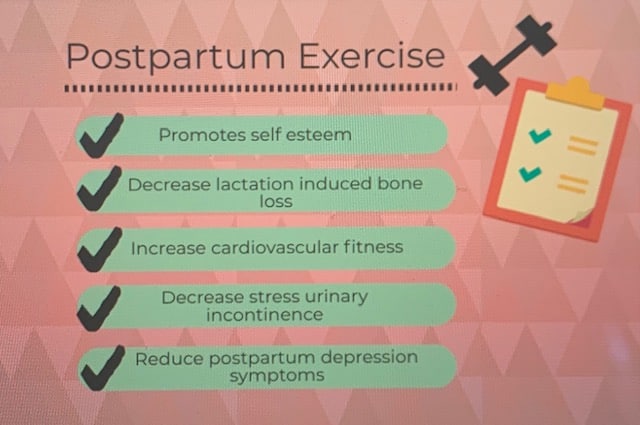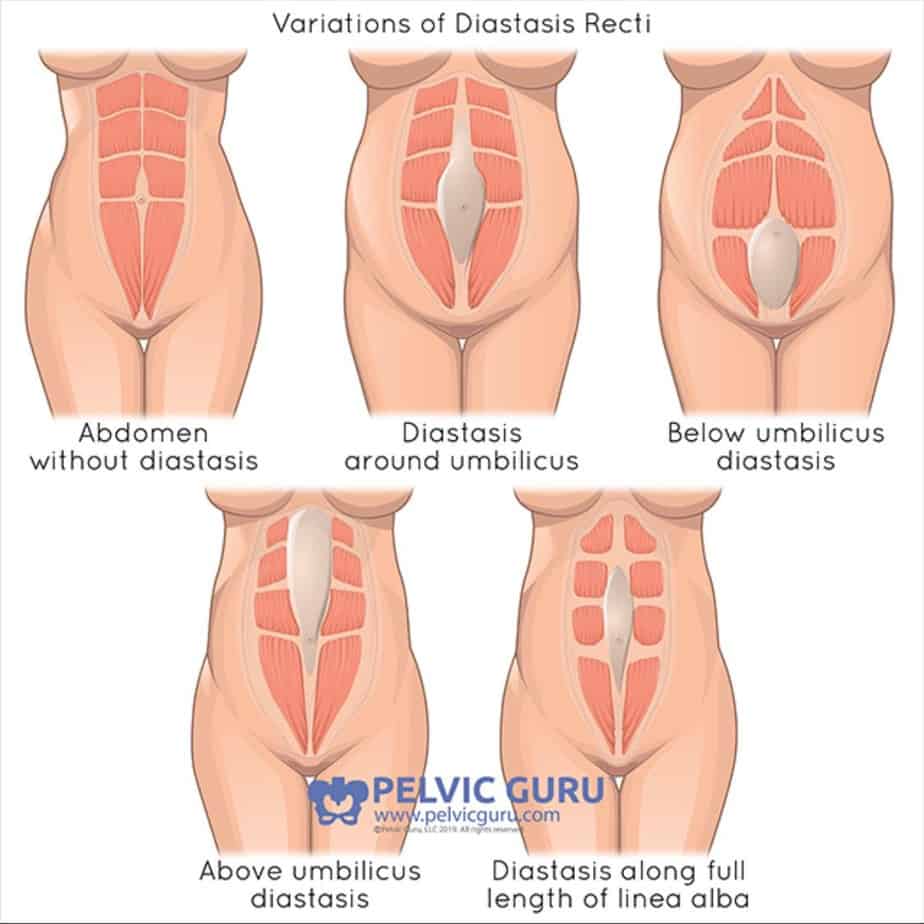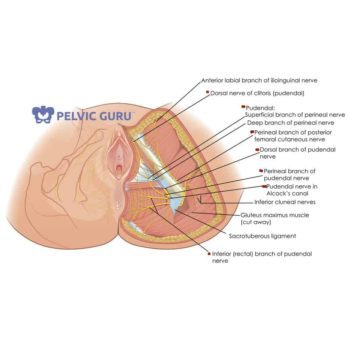A New Mama’s Guide to Healthy Postpartum Weight Loss & Exercise (Part 2)

Safe Postpartum Exercise
New mothers are typically cleared to return to exercise during their 6-12 week postpartum check up and are advised to return gradually to exercise (ACOG 4). This is not a green light to jump back into your previous routine full steam ahead. Recovery from childbirth takes time, whether it was vaginal delivery or cesarean, as each body has its own time frame for healing.
Postpartum exercise should be approached with caution as there is not a one-size-fits-all-approach, and should be tailored to fit individual needs.
Until the effects of pregnancy and postpartum hormones wear off, it is vital to modify physical activity in order to avoid injury. “Too much, too soon” can result in urinary incontinence or pelvic organ prolapse. Generally speaking, women should avoid high impact exercises (running, jumping, heavy weights) until they can pass a stability test.
The American College of Obstetricians and Gynecologists recommends 20-30 minutes of daily walking for postpartum women, as well as light strengthening exercises for the entire body, including the pelvic floor (4).
Strategies For Success

Exercise has many benefits for improving overall quality of life for new mamas and their babies. For most women, pregnancy and postpartum are generally associated with a decline in physical activity, with lack of child care and time constraints cited as the most common barrier to exercise (5). Preplanned strategies can help new moms incorporate exercise into their busy day:
- Joining a new mothers group, for example, can provide motivation and accountability to a fitness plan
- Babies can be brought along for daily walks, yoga classes
- New moms can also plan to be active when they would otherwise not, like when watching television or during tummy time
Breastfeeding & Exercise
For nursing mothers, neither breast milk quality or production are negatively impacted by moderate exercise. Breastfeeding mothers may want to utilize a supportive bra and nurse prior to exercise to avoid the discomfort of engorged breast. For nursing moms, the following guidelines are recommended (1):
- Low to moderate intensity exercise; or
- Nurse before strenuous exercise; or
- Store pre-exercise milk for later; or
- Wait 60-90 minutes after exercise before nursing
Resistance Training Enhances Fat Loss
Resistance training can be a useful tool in enhancing postpartum weight loss outcomes when combined with a healthy diet and aerobic exercise. 1 It builds muscle mass, speeds up metabolism, and aids in injury prevention for new mothers. Resistance training or strength training incorporates:
- Lifting weights
- Resistance bands
- Using ones’ body weight to load muscles
Building muscle mass increases the body’s metabolic efficiency, as muscle will burn 30% more calories compared to fat when at rest. This means that mothers will start to burn off more energy even when they are not active. Aerobic exercise may not be as effective for weight loss, however there are many cardiovascular and psychological benefits associated with regular aerobic activity.
Pelvic Floor Physical Therapy
New mothers should should seek out a pelvic floor specialist if they experience any of the following symptoms with exercise:
- Urinary leakage
- Pelvic Organ Prolapse: feeling of something falling out of the vagina, heaviness in the pelvis
- Pain: Low back, SI joints, Tailbone, Pelvic
- Abdominal wall separation, belly bulge
A pelvic floor physical therapy specialist can help new mothers safely transition back to a regular exercise routine and address many other components of postpartum care. The evaluation will address concerns such as activity limitations, pelvic pain, and bowel, bladder, or sexua dysfunction.
A postpartum pelvic physical therapy evaluation will assess:
- Abdominal wall for separation or diastasis recti
- Core strength
- Pelvic floor strength and muscle tone
- Postural and pelvic alignment
- Myofascial restrictions
- Scar adhesions
Your pelvic floor physical therapy specialist will design a plan of care with goals specific to your needs to ensure optimal recovery. Depending on the severity of symptoms, this can often be achieved within a few sessions of preventive care over a few weeks.
Summary of Healthy Postpartum Weight Loss & Exercise Tips
- Avoid crash dieting
- Incorporating high value foods & regular meals will promote gradual weight loss
- Develop healthy sleep & hydration habits to promote tissue healing & lower stress hormones
- Start slowly with return to exercise: include daily walking & gentle strengthening of all muscle groups, including pelvic floor muscles
- Enlist social support: increase motivation & accountability with exercise, new mom support groups to improve coping skills & reduce isolation Include your baby in your physical activity routine with daily walking or tummy time
- Strength training to build muscle, enhance fat loss & reduce injury risk
- Seek professional help when needed: pelvic health specialist, registered dietitian, psychotherapy for postpartum depression
By Victoria Garrett, PT, DPT
Sources:
- Cochrum, Robbie. (2015). Postpartum Weight Control and the Contribution of Exercise. International Journal of Childbirth Education 2015; 30: p48-53. 6p
- Nartea, R., Mitoiu, B. I., & Nica, A. S. (2019). Correlation between Pregnancy Related Weight Gain, Postpartum Weight loss and Obesity: a Prospective Study. Journal of medicine and life, 12(2), 178–183. doi:10.25122/jml-2019-0015
- Saligheh, M., Hackett, D., Boyce, P. et al. Can exercise or physical activity help improve postnatal depression and weight loss? A systematic review. Arch Womens Ment Health 20, 595–611 (2017). https://doi.org/10.1007/s00737-017-0750-9
- ACOG postpartum toolkit: Achieving a healthy weight in the postpartum patient [Fact sheet].(n.d.). acog.org/-/media/Departments/Toolkits-for-Health-Care-Providers/Postpartum-Toolkit/ppt-weight.pdf?dmc=1&ts=20190917T1749210981
- Nascimento, S., Pudwell, J., Surita, F., Adamo, K., & Smith, G. (2014, May). The effect of physical exercise strategies on weight loss in postpartum women: A systematic review and meta-analysis. Retrieved January 24, 2020, from https://www.ncbi.nlm.nih.gov/pubmed/24048142/
- https://online.norwich.edu/academic-programs/resources/prenatal-postnatal-care







